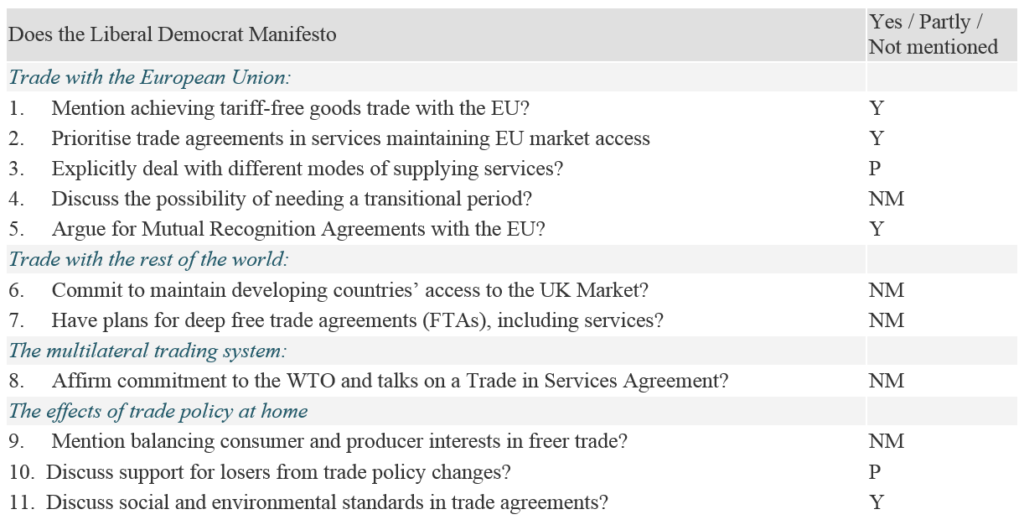18 May 2017
Compiled by Fellows of UKTPO
Brexit will leave many areas of UK policy open to change. International trade policy is among the most important of these for UK prosperity and also among the most immediate because the status quo cannot simply be extended. This is the second in a series of blogs reporting what the major political parties say about trade policy in their 2017 manifestos, as they become available.
The UK Trade Policy Observatory (UKTPO) has set out a series of issues that it believes should be considered in any election manifesto that might form the basis of the UK’s future trade policy. The table below checks whether or not the Liberal Democrats’ Manifesto mentions these important elements explicitly or implicitly. Following that we offer a brief commentary on the treatment of trade policy in the manifesto.
The central plank of the Liberal Democrats’ manifesto is remaining in the single market and the customs union. This implies no change to current trade policies and hence little need to discuss them in the manifesto. Thus their coverage of trade policy is rather sparse.

The Liberal Democrats aim to stay within the EU’s single market and customs union. Their first choice is to remain within the European Union:
‘We continue to believe that there is no deal as good for the UK outside the EU as the one it already has as a member.’
and failing that
‘… any deal negotiated for the UK outside the EU must ensure that trade can continue without customs controls at the border, and must maintain membership of the single market.’
And they explicitly argue the need for a ‘common rule book’ for trade with Europe (which includes common standards and certification procedures).
Given their principal aim, and in line with manifestos from previous elections when membership of the EU was not in question, they feel little need to spell out any details of their plans for international trade – it is all taken care of by the EU. They do mention, however, protecting the City’s ‘full rights in EU financial markets’, the value of highly-skilled migrants to universities and other parts of the economy, remaining part of EU research funding schemes and their support for ‘the principle of freedom of movement’, which is key to trade with the EU in services.
While the Liberal Democrats espouse a strongly international and liberal outlook on the world, there is no mention of world trade per se nor of market access for developing countries, although they do propose ‘using trade as a diplomatic tool to prevent violent conflict worldwide’
There is no explicit link between trade policy and the distribution of income and welfare, but the manifesto commits to
‘ensure that the priorities and long-term interests of the nations of the UK are fully taken into account during [Brexit] negotiations’.
It offers ‘regional support for deprived areas’ and support for small businesses, digital skills and innovation through domestic policy rather than merely as a counter to any consequences of trade policy. It also recognises innovation, science and new technology as critical to Britain’s ability to trade internationally.
The Liberal Democrats praise the EU’s high environmental standards and commit to ‘[e]nsure that future trade deals require high safety, environmental and animal welfare standards for food imports …’.
The Liberal Democrats’ treatment of international trade policy is sparse, but it is not weak: their policy is to remain part of the EU’s trade policy, which already has defined positions on the various issues that UKTPO has identified.
While the UK Trade Policy Observatory (UKTPO) takes no institutional position and will continue to remain firmly non-partisan during the UK General Election, it believes it is useful to share some of the questions that its fellows think will be important when reviewing what the party manifestos say about trade.
Examining manifestos is particularly important, because the winning party’s manifesto may be cited under the Salisbury Convention, which precludes the House of Lords from opposing bills passed by the Commons to honour election manifesto pledges.
See also: What do the General Election Manifestos say about International Trade? Labour
Disclaimer:
The opinions expressed in this blog are those of the author alone and do not necessarily represent the opinions of the University of Sussex or the UK Trade Policy Observatory.
Republishing guidelines
The UK Trade Policy Observatory believes in the free flow of information and encourages readers to cite our materials, providing due acknowledgement. For online use, this should be a link to he original resource on the our website. We do not however, publish under a Creative Commons license. This means you CANNOT republish our articles online or in print for free.